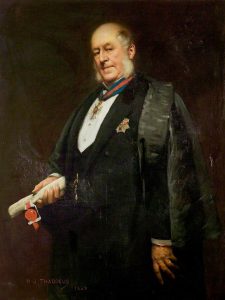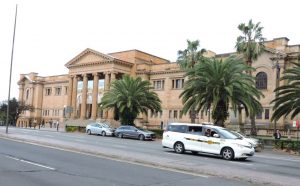
Thaddeus, Henry Jones; Sir Arthur Hodgson, KCMG, DL, JP, Mayor (1883-1888), High Steward (1896-1902); Stratford-upon-Avon Town Hall; http://www.artuk.org/artworks/sir-arthur-hodgson-kcmg-dl-jp-mayor-18831888-high-steward-18961902-55784
Stratford has been lucky to have attracted a number of influential people who have contributed significantly to the town’s development as a vibrant cultural centre. One of these was Sir Arthur Hodgson, a wealthy businessman who retired to the town and devoted his last thirty years to it. His portrait, hanging in the town hall, oversees the business meetings of today’s Town Council.
Hodgson was born in Hertfordshire, the son of a vicar, in 1818, and educated at Eton and Cambridge. After three years in the Royal Navy he set off to Australia, arriving in Sydney at the age of 20 following a four and a half month sea voyage. He had met influential people on board and arrived with letters of introduction that ensured he was able to set up a sheep station, founding a settlement, Eton Vale, in 1840. He also became a politician, rising to Colonial Secretary for Queensland in 1869, before he left Australia to return to England in 1870, his fortune made. In 1873 he purchased the Clopton Estate near Stratford-upon-Avon and quickly settled into the community. This post-retirement career was impressive. He was Mayor of Stratford a record five times 1883-88, High Steward of the borough in 1884-89, Deputy-lieutenant and High Sheriff of Warwickshire in 1881 and was also honorary colonel of the 2nd battalion, Royal Warwickshire Regiment. He was appointed Companion of the Grand Cross in 1878 and Knight Commander of the Grand Cross in 1886 for his services to Queensland.
He also involved himself in local charitable and sporting activities, including the Shakespeare Club, becoming a member in 1876. While Mayor he would have been the Club president ex officio, but he rarely attended meetings. The Club had reformed in 1874 but by the late 1880s it was lacking in energy, probably owing to the ongoing illness of its Vice-President Charles Flower. When Flower died in 1892 Hodgson stepped into the vacuum. Under his influence the next year the Club organised the most elaborate Birthday Celebrations for years. It was, fortuitously, Easter Sunday, and the town was decorated with flags, streamers and laurel festoons and, led by the town band, the Mayor and Corporation, the Trustees of Shakespeare’s Birthplace, Shakespeare Club members and the Governors of the Memorial Theatre walked in procession to the church for a special service in honour of the poet’s birthday.
This revival may also have encouraged another of the town’s Shakespeare traditions, as it was also in 1893 that King Edward VI School began its involvement in the Birthday Celebrations with its first presentation of a floral wreath.
Hodgson was responsible for improving the quality of Club meetings, giving his own paper on Shakespeare and Italy in which he referred to his correspondence with well-known scholar Mary Cowden Clark. He encouraged women into the Club, first welcoming them to meetings as visitors, then introducing membership for them (his wife and daughters were some of the first members). He improved the quality of the speeches at the birthday by including a talk by the eminent physician Sir Benjamin Ward, on Shakespeare’s Psychological Point of View and introduced outside speakers to the monthly meetings of the Club, one of the first being the American poet and author William Winter. At this time too the Stratford-upon-Avon Herald began printing full reports of the Club’s meetings.
His enthusiasm for Shakespeare was genuine. He was a member of the Memorial Theatre’s Board of Governors when it opened in 1879 and a Life Trustee of Shakespeare’s Birthplace. In 1902, the year of his death, he published for private circulation Shakespearean Jottings, a lecture given in the Stoneleigh Institute, Warwickshire. In it he aimed “to give inadequate expression to my love and reverence for the master-mind of all literature and the interpreter of all future ages of human nature”. Reading it recently I found the man’s forthright character comes through, though he seems to have had a rather careless concern for facts. He writes with absolute certainty that at 11 Shakespeare saw the celebrations at Kenilworth Castle, and was “a good husband and a kind father”, though he acknowledges no diary or correspondence survives.
Described in the Australian Dictionary of Biography as ‘upright and inflexible’, the Town Hall portrait of him shows a man proud of his achievements, but also, his head turned and slightly bowed, a man who listened, perhaps something he learned from the works of Shakespeare. At his death in 1902 Hodgson had been involved in the town for thirty years, an extraordinary record of service to his adopted home.
The other reason I have been reading up about Hodgson is that link with Australia, which I visited earlier in 2016. While in Sydney I went along to the State Library for New South Wales (the oldest Library in Australia), which has a Shakespeare Room, and have since been in correspondence with their Curator Sarah Morley who tells me they hold manuscript material and photographs relating to Arthur Hodgson. As there is this connection, a copy of our book The Story of the Shakespeare Club of Sratford-upon-Avon 1824-2016: Long life to the Club call’d Shakspearean has been presented to the Library. More information on Sir Arthur Hodgson and the history of the Club can be found in the book.


